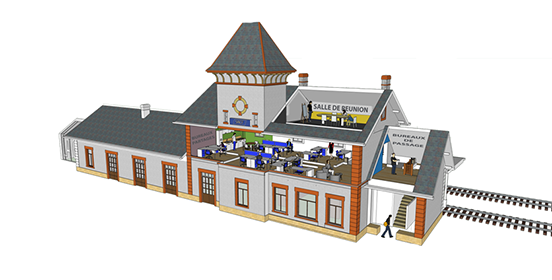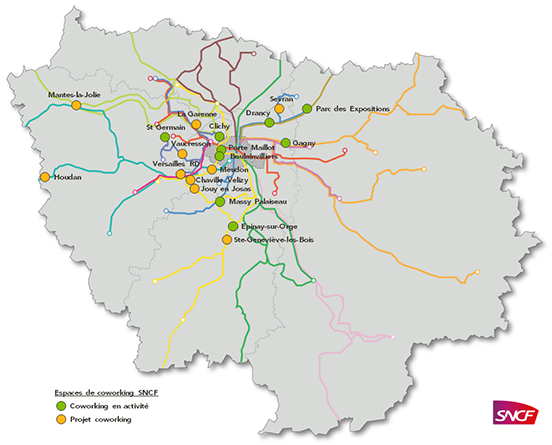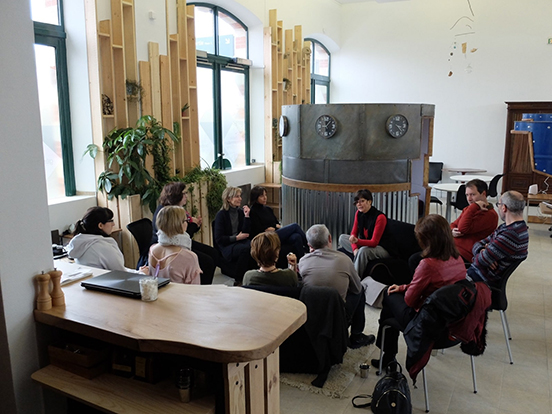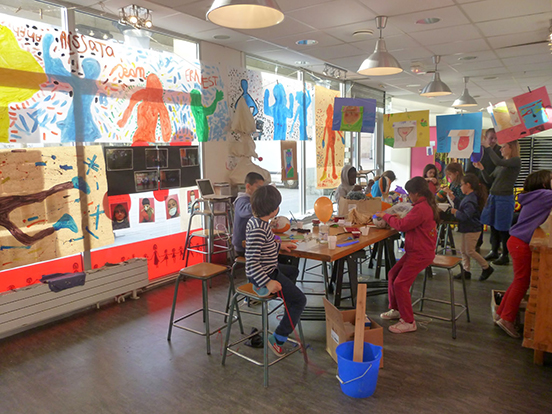[Workstyle Reforms in France (2)] Supporting local incubation from workspace within railway stations
SNCF (Société Nationale des Chemins de Fer Français, French National Railway Company)
Among cities in Europe and the United States, Paris has one of the largest numbers of office workers commuting by train. Serious commuting stress has become a social problem, as in Tokyo. Furthermore, the environment surrounding workstyle reforms has a lot in common with that of Japan, such as a conservative corporate culture. In this series, we will introduce interviews on workstyles in France so as to provide inspiration to Japanese companies.

In Part 1 of the interview with SNCF, France's national railway company, we introduced SNCF's efforts to reduce commuting stress in France through workspaces provided within railway stations. However, SNCF is currently taking on further missions, including revitalizing local communities and incubation from its workspaces.
Renovating station master's quarters into incubation spaces
'Workspace,' which is the last of the four types of Work & Station, are spaces that were renovated from station master's quarters. Many of the railway station buildings in Greater Paris were constructed between the end of the 19th century and early 20th century. Station masters used to live in quarters attached to stations, though not any more. SNCF has renovated such vacant quarters as workspaces spanning 70 to 250 square meters.
The characteristics of the spaces are that they are intended to solve social problems such as through the revitalization of local communities and relief of the vulnerable, and play an incubator role. They are meant to support projects of social significance and differ from other general spaces simply for rent.
Many of the stations where these spaces have been decided to be established are located in areas called 'vulnerable urban areas'*1 where housing for low-income earners are clustered. The unemployment rate and crime rate are especially high among young people in such areas. SNCF provides space for very reasonable prices to projects aimed at supporting the youth's labor participation and incubation, as well as long-term unemployed persons' participation in the labor market in such areas.
- *1 Following the death of two youths in the suburbs of Paris in 2005 after being chased by the police and the subsequent nation-wide riots, urban social policies were reinforced and priority areas for tackling economic and social problems were selected, such as 'vulnerable areas.'

For example, lectures by lawyers, certified public accountants, and tax accountants, workshops with entrepreneurial consultants, and information exchange meetings between users and exchange events between residents are held at the spaces for incubation. Since these projects are supported by the local government, residents can participate for free. There are current seven such spaces, with about 20 more to be completed in the future. There is only one space in Paris, with all the others located in the suburbs.
"The workspaces have assisted in entrepreneurship of the youth with a support system as strong as incubators and have succeeded in retaining them in the local community and supporting entrepreneurship locally. I think it is very significant in terms of regional economy revitalization to invest in areas with problems such as 'vulnerable urban areas' and establish systems for launching businesses from such areas." (Catherine Priol, head of station redevelopment, SNCF)
This project has coincided with the entrepreneurial trend in France at the moment and has captured many start-up demand. Users vary from the young to the retired, and successful examples are many. One of such successful examples is a trainers brand founded by a group of young people in Drancy, a 'vulnerable urban area' located 20 minutes north of Paris. Thanks in part to the cooperation of the mayor of Drancy, the brand that has grown significantly has become the pride of the local residents. Without SNCF's initiatives, they would have had no other choice but to launch in Paris, meaning that a brand out of Drancy would never have existed.
Another example is in Saint-Germaine-en-Laye, which is about 30 minutes northeast of Paris. Although it is not a 'vulnerable urban area,' there have been cases where the middle-aged generation aged around 45 to 50 has started up business in this district where unemployment of the older age has been rising year after year. They consider leaving the company they have worked for for a long time to found their own business and obtain information on entrepreneurship in various industries such as restaurant and interior decoration with the support from SNCF's co-working space. There is a very high affinity between social problems that are also common in Japan, such as supporting local revitalization and entrepreneurship of the youth and the older generation, and suburban workplaces.

The 1001 Gares (Stations) project that started at the national level
Currently in France there are many small railway stations where trains have ceased to stop or stations with unused space due to redevelopment of the station. SNCF started a project for using such space to invite services and associations that the community requires through a bid. The name of the project is '1001 Gares (Stations).' As pilot cases, SNCF called for projects to be held at 30 stations in the suburbs of Paris between April and June 2018, and chose 35 startups and groups that were expected to contribute to revitalization of the community. In June 2019 SNCF expanded the target stations to 300 stations across France.
Some of the projects have succeeded significantly, with the services provided not only to SNCF users but also to all of the residents of the community. For example, at Massy - Palaiseau station (30 minutes south of Paris), a new station building was constructed right next to the old building to modernize the station. As these suburban stations tend to be symbols of the town, SNCF determined that it would be better to attract functions that would revitalize the community instead of destroying the old station building that has ceased to be used. A sports goods recycling operator was chosen from among the many applicants and celebrated the opening of a store in November 2019. The store is already being used by many residents.
Another example is a babysitting center that opened in Argenteuil station, located 15 minutes from central Paris. The center not only babysits children aged 4 to 12 but also intends to make the children have contact with art such as fine art, dance, and music. The usage fee varies depending on the income of the family, with subsidy offered to low income families from the city. This babysitting center is operated by an association and is very successful.

"The government supports social projects that lead to sustainable economic development of the area and participation of disabled or unemployed persons in society. Such projects join the 1001 Gares project. An eco-system has been created where projects of social significance are carried out in unused former station sites and spaces with subsidy from the central or local government, revitalizing the community." (Antoine Martin, head of the co-working space program, SNCF)
Providing value of existence to stations seldom used
In addition to regional contribution, such projects are significant also in terms of conserving station buildings and land, which are the assets of SNCF. Unused buildings become delapidated and their improvement and expansion costs become huge, eventually ending up with the buildings being demolished. However, effective use of the buildings and land through various projects provide appropriate maintenance, which maintain the asset value.
"We have always struggled with the problem of old buildings and spare space. We have considered railway stations as open spaces for user services and attracted various providers and services, but what is the existence value of small stations that are seldom used? It is our mission to come up with ideas, launch projects, and try them out to conserve assets and revitalize the community instead of demolishing such stations." (Ms. Priol)
Railway stations in France are concerned that unless they are revitalized through such services, the atmosphere will rapidly deteriorate. Then people will increasingly avoid going near the stations, and the stations will become a place for the homeless and may even be squatted. From a security perspective it is also important to provide value of existence to railway stations more than simply as a means of transport.
Changes in people's consumption orientation have boosted initiatives for regional revitalization such as the 1001 Gares project. It is because people prefer locally produced products and local artists, and are focusing on consumption rooted in the community. They prefer local companies to enliven their local railway stations rather than inviting international companies such as Starbucks as operators.
"I believe that the possibilities of initiatives that connect users from railway stations will continue to spread. Such initiatives include SNCF, a company that represents France, to aggressively promote telework and indicate guidelines for workstyle reforms across France, to actively introduce projects that generate employment and revitalize the regional economy without being satisfied only with providing workspace in the spare space of station buildings, and to create new forms of local communities." (Ms. Priol)